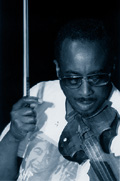
|
|
|
|
|
|
Photo Credit: Jeffrey Kliman |
John Blake
This edition of Billy Taylor's Jazz At The Kennedy Center spotlights violinist John Blake. Blake has worked with saxophonist Grover Washington Jr. and pianist McCoy Tyner, among other jazz greats, led groups under his own name and distinguished himself as a music educator. After opening with an unabashedly swinging reading of Nat Adderley's "Work Song" -- which also features Dr. Taylor on piano, bassist Chip Jackson and drummer Winard Harper -- Blake, a native Philadelphian, begins discussing the origins of his musical development. He informs Dr. Taylor and the Kennedy Center audience that his first instrument was not the violin but the piano. And as with many jazz musicians, his musical foundation came from the European classical tradition. By the time Blake reached third grade, however, he discovered the instrument for which he is best known and became acquainted with the work of renowned violinists such as Isaac Stern. Later in his musical studies, Blake discovered Indian music -- an influence which continues to inform his approach to the instrument and which finds its way into a uniquely lyrical reading of "All The Things You Are" with Dr. Taylor and his trio. Following this well-received performance, Blake and Dr. Taylor discuss the influence of the late saxophonist Grover Washington Jr. and Blake's five-year tenure with pianist McCoy Tyner. The violinist then delights the Kennedy Center audience with a rhythmically fecund, solo reading of Tyner's "Passion Dance." In the course of answering audience questions with Dr. Taylor, Blake is asked the source of his greatest musical inspiration. His mother "playing behind church choirs," he responds, noting that he tries to infuse his playing with the same degree of passion and inspiration. After an appropriately passionate, Latin-tinged interpretation of "Here's That Rainy Day" performed with the trio, Dr. Taylor asks Blake if there is a different technique for teaching jazz rather than classical music. Blake informs Dr.Taylor that a key to introducing students to jazz is getting them to embrace the concepts of improvisation and imagination. Those concepts and more are magnificently displayed in the evening's concluding performance, a robustly swinging rendition of the Dizzy Gillespie classic "A Night In Tunisia."
|
|
| |
